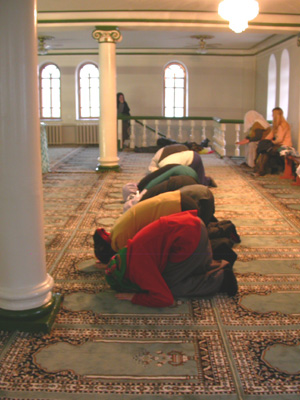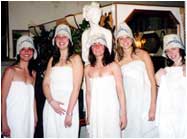
A Triple Play for Monotheism
Students visit three houses of worship and observe Russian faith in action
By LILA ARZUA
Posted Sunday, March 16, 2003; 2:10 a.m.
 |
|
Moscow - A group of women pray Salaat al-Asr, or the afternoon prayer, from the upstairs balcony of the Cathedral Mosque. PHOTO: Meital Hershkowitz |
MOSCOW - For most of the class, morning began with a pilgrimage to The Breakfast, a much-hailed tradition at the Renaissance Hotel. Omelets, fried sausage, and fresh fruit lured early risers still operating on Eastern Standard Time. Others, some of whom had experienced the rougher side of Moscow nightlife on Friday, did not partake.
The day promised
to be filling nonetheless, featuring a trifecta of worship services with
Orthodox Jews, Muslims and Russian Orthodox.
Bellies empty
or full, students walked with Andrei Zolotov to the Maryina-Roshcha Synagogue,
the local Lubavitch house of worship. There, security guards scrutinized
the students entering the lavish building of polished marble and Doric
columns. The three-year-old edifice, which houses the largest Jewish community
center in Europe, stands on the site of another synagogue destroyed by
arsonists shortly after the fall of Communism.
The ground
floor bustled with men in prayer shawls and small children underfoot.
Dozens of men stomped on the ground and banged on tables as the Torah
portion, which mentioned Amalek, the quintessential enemy of the Jews,
was read. The banging symbolized the stamping out of the origin of evil.
The sparse perimeter of women peering from the balcony remained relatively
subdued.
BBC correspondent
Steve Rosenberg, a regular at Saturday services, told students that since
he arrived in Moscow 1991 he has seen a decline in anti-Semitism. When
he first arrived, Jews were secretive about attending services for fear
they would lose their job or university enrollment. Today, he said, a
substantial religious revival has brought many Jews back to regular worship
and the faith back to prominence. Recently, Russian president Vladimir
Putin attended services at this synagogue and lit the menorah, symbolizing
official acceptance of Judaism.
At a smaller
synagogue next door, a group of Bukharan Jews, who observe the Sephardic
tradition, took turns reading from the Torah. Students saw a familiar
face among those surrounding the scrolls. Professor Ari Goldman was invited
to say a blessing over a portion of the Torah. In turn, a rabbi blessed
him and his family and thanked God for Goldman's survival of the ordeal
of international air travel. The men's floor was also crowded but, excepting
the female members of the class, only one woman was spotted in attendance.
Over a lunch
of salads, beef stew and oranges, Rabbi Avraham Berkowitz, executive director
of the Federation of Jewish Communities of the Commonwealth of Independent
States, blessed wine, then told the students about issues concerning his
congregation, including a recent attempt by the Russian Orthodox Church
to instill religious instruction in public schools. He also described
the vast social service network of day care and soup kitchens the synagogue
runs and his rise to a leadership role in the Moscow congregation at the
age of 26.
At the end
of the meal, Chief Rabbi Berl Lazar, spiritual leader of the Russian Jews,
joined the class. Lazar, who sits on Putin's Council for Cooperation with
Religious Organizations, said he questioned the tendency of some new religious
movements in Russia to misrepresent themselves. In particular, he singled
out Jews for Jesus, comparing their proselytizing to Jews as Jews to bottling
Pepsi and calling it Coca-Cola. The case for religious freedom of this
group was not discussed.
After the
meeting, students braved a long, treacherous walk to the Cathedral Mosque.
At the 99-year-old mosque, the group headed straight upstairs to meet
with Dr. Farid Asadullin, an external affairs executive of the mosque,
who told students that Muslims in Russia observed their faith for centuries
in mosques and tents until suppressed by the Soviet regime. Yet this historic
mosque was never closed during Soviet rule.
"Today
the church-state relationship is the best Muslims have had," Asadullin
said, through Andrei Zolotov, who was translating. He spoke, however,
of what he said was "a disease called Islamaphobia with which the
whole world is sick."
Students
soon headed to the prayer service. Men and women alike removed theirshoes,
and the women climbed stairs leading to the balcony, where, again, women
worshippers were outnumbered by the men sitting downstairs.
Members of
the class were then presented with their first choice since breakfast:
remain at the mosque; experience Vespers at Holy Trinity Russian Orthodox
Church; or return to the hotel and risk arousing the Lord's wrath, Goldman
said.
Those who
chose to go to church saw a building that was peach-colored on the outside
and candle-lit within. Beneath a wall of icons, priests chanted and more
than 100 women clustered together, bowing and crossing themselves. Some
kissed the icons while others lit candles.
Rows of the
women waited in line for confession. When each reached her turn, she would
whisper in the priest's ear and then kneel before a Bible. The priest
extended a strip of his purple vestment over one woman's head and blessed
her to receive Communion on the following day. Each woman then stood,
kissed the Gospel and rejoined the bulk of the congregation. Only a handful
of men were in attendance.
Students
walking back to the hotel from Vespers caught sight of a breaking news
event: several dozen protestors holding signs and shouting outside an
apartment building. One picketer explained in broken English that the
group was upset about city plans to replace the housing with a huge garage.
Despite the promise by teaching assistant Manya Brachear of a wakeup call at 6 a.m. the following morning, many members of the class left for an excursion to a local bathhouse where they disrobed and called it a day.
Click
on to  Photogallery
Photogallery
<Dispatch Day 1: Previous Next: Dispatch Day 3 >
Click
below to go to
Day 2 Photo Gallery:

Sidebar
Special:
Click
on the photo below to read about one part of the group's adventure to
Moscow's oldest bathouse:

QUICK
LINKS:
Feature
Stories | Dispatches
| Photoessays
|Itinerary
& Maps
|
About
This Class
A project of the Columbia University Graduate School of Journalism made possible by the Scripps Howard Foundation. Comments? E-mail us.
Copyright
© 2003 The Graduate School of Journalism at Columbia University.
All rights reserved. Reproduction in whole or in part without permission
is prohibited.





